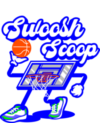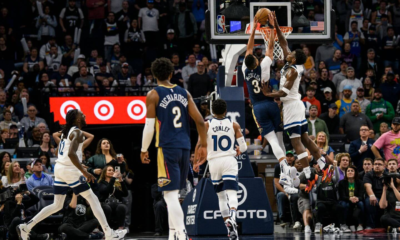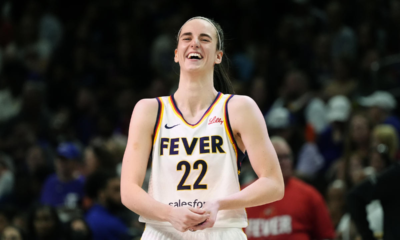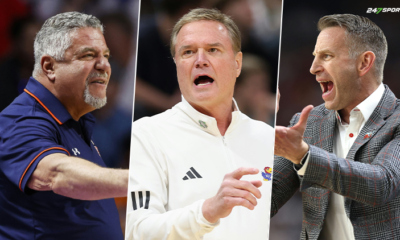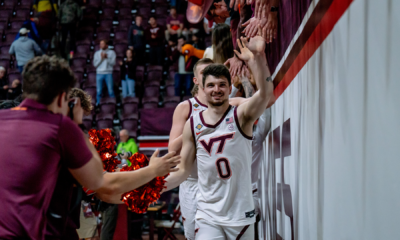Sports
The Oral History of J. Cole's Basketball Career – Bleacher Report

“You looking at LeBron James of the game,” J. Cole rapped on his breakout mixtape, “The Warm Up,” in 2009, just as he was catching the attention of future label boss Jay Z and long before his unstoppable record sales spawned its own meme.
It’s unlikely, though, that even the braggadocious Jermaine Lamarr Cole of yesteryear could have anticipated the actual LeBron James tweeting his (Bron-centric) lyrics before a game would eventually become a nonevent.
There was a time, though, when J. Cole aspired to be James-esque on the hardwood and not just in the recording studio. Two years of varsity high school basketball and a stint practicing with his college’s women’s team left an indelible mark both on Cole’s lyrics and those who witnessed his evolution into one of the rap world’s most unstoppable forces.
Here, the teammates and coaches who supported the rapper’s hoop dreams share their favorite stories about the baller-turned-M.C.
Terry Sanford High School, Fayetteville, North Carolina (1999-2003)
Matt Starks (Terry Sanford ’03): I’ve known Cole since kindergarten; we’ve played basketball together since we were in rec leagues. Anyone who knows him knows that Cole’s main love outside of music is basketball.
J. Cole (in a 2013 interview with Sports Illustrated): I was always in love with basketball as a kid, but I thought I was way better than I really was, because I didn’t have a male figure around to show me how to actually play. Me and my brother just kind of figured it out playing rec ball. I went to a middle school that didn’t have a team. That kind of set me back.
Michael Broadhurst (head coach, varsity basketball, Terry Sanford High School 2001-2008): I met Jermaine his freshman year and was there with him all the way through his graduation in 2003. He didn’t make the team as a freshman, so he was the manager. Stuck around, stuck it out, didn’t quit on it. Very confident young man, talked quite a bit, but also willing to put the work in to get better and hone his craft.
J. Cole (SI): I tried out for the team my freshman year and I got cut. I couldn’t understand because I thought I was really good, so I blamed the coaches and thought they had it out for me.
Blake Joeckel (Terry Sanford ’03): I’m assuming Cole wanted to be associated with basketball and the team in some way, so when he didn’t make the team at first, he became a team manager. That plays into everything—he was just such a hard worker and so determined. If players wanted to get some extra practice, he’d stick around after and play with them.
J. Cole (in a 2012 interview with Ballislife.com): I became the manager of the team. Now, you would think that next year I’d just make the team off of GP [general principle]. Don’t you know my name was on the cut list? I was heartbroken. You talk about disbelief. I realized I had to kick it into [gear] the next year.
Michael Broadhurst: He used to stay late with A.B. Lehmann, who would be MVP Cole’s senior year, and play one-on-one full court. And it wasn’t just like they would run down and wait—they played defense all the way up and down the court. It was amazing to watch.
J. Cole (SI): That was the first time I started working like a real basketball player: A thousand shots a day, sprints, minute drills, one-on-one full court with the star player on the team, every day, literally, for the entire school year then the entire summer. Then I also sprouted up to 6’2″.
Blake Joeckel: I remember him always working hard and wanting to be better—he was passionate about whatever he put his mind to. He tried out every year, never got discouraged, and made the team his junior and senior year. Obviously that kind of extends to everything he does, whether it’s basketball or school or, obviously, music.
Matt Starks: We were really bad our junior year. At one point, Cole got dunked on by Chad Mohn, a 6’8″ white guy who was actually one of the best players in the state (he wound up playing at UNC Asheville).
I had the ball, and Wallace Wright (who eventually played for the New York Jets) stole it from me. I was chasing him back down the court and he passed it back to Chad, who Cole was trailing. Chad didn’t see Cole coming, so Cole thought he could sneak around and surprise him—again, Cole’s 6’3″ and Chad’s 6’8″—but instead Chad dunked on him.
He never lets me live that one down.
Michael Broadhurst: Cole’s senior year, though, everything was clicking. We had ball-handling, we had wings and perimeter, not a lot of size. Really and truly, J. Cole was one of our bigger players as far as height.
Matt Starks: Our senior year, we were actually really good. Cole didn’t start at first; he came off the bench. We had the Coach of the Year in the conference, the Player of the Year in the conference, three of us made the All-Conference team—so it’s not to say he was bad, we just had a pretty good team. But right before the last four or five games of the season, one of our forwards quit. After that happened, Cole moved in and started.
Michael Broadhurst: Anyone who’s been around the teams I’ve been involved with, I will reward the way you practice. He put the practice time in, so he started a few games his senior year and played in pretty much all of them. He was a very valuable member of a very good team.
Matt Starks: Because he was the longest player we had, he was one of our best shot-blockers and one of our better rebounders.
Michael Broadhurst: We were a five-out motion team, and Cole played anywhere from the 3 to the 5. He was a wing player and also got down in the post for us with his height—he was around 6’3″, 6’4″. He was one of our lockdown defenders; there was no question about that.
Cole drew some of the toughest assignments every week, along with one of his best friends, Ronald Hill [Hill is still affiliated with Cole’s label, Dreamville]. They were two of our lockdown defenders. Offensively, he was out on the break, dunking off the wing, shooting the three.
Matt Starks: Cole was so close to dunking cleanly. Sometimes in practice he would get it, but he hadn’t ever done it in a game. During our senior night, we were up big, he was starting, and at one point he stole the ball. He had a breakaway, came from the left side (just like he always did in practice), got to the middle of the lane and jumped off of his left foot for a one-handed dunk.
We all thought he was going to get it—on the game tape, you can see everybody standing up in anticipation. He went up, it looked so good, and then he missed it. The ball popped straight up in the air, and the whole crowd was like, “Awww….”
But the best part was that he actually grabbed the rebound, drove in, and went up and under in a way that was reminiscent of Dr. J. That went in, and the place went nuts. There were like five seconds of everybody feeling bad for him, but then he went up and made one of the best layups we’d ever seen.
Blake Joeckel: He was a hustler, and that’s the best way I can say it. He was always going 100 percent, never let up. He would do whatever he could to help the team. And he was tall, so that was always nice.
J. Cole (SI): I wasn’t the star player, far from it, but my growth was so quick that by the time I was a freshman in college I had the talent of someone that should have at least been on the bench at a D-I school.
Matt Starks: I thought Cole was one of the funniest ones on the team—plus, he could take any joke. He was always well-liked. He even won best-dressed, somehow, our senior year.
Blake Joeckel: Even if he wasn’t starting or playing a lot, Cole was always the guy who was up, cheering his team on. If a player would get down, he’d give him a pat on the back. He was always encouraging, never put anybody down. Just a really good team player.
Matt Starks: Our senior year, I think eight of us on the team were seniors. We were always together, either playing or talking about playing. Before games, one of the guys’ parents would always get food, and we’d go to their house.
In the summers, [A.B. Lehmann]’s dad [famed local coach Austin Lehmann] had a basketball camp, and myself and him and Cole were counselors—got paid $100 a week. We’d play ball after the camp, and then we’d go to my grandparents’ house and go swimming because they had a pool. Do it all over again the next day.
Also, we graduated the same year as LeBron James. Our entire team went to Greensboro when his team [St. Vincent-St. Mary] played Winston-Salem Reynolds, just so we could see this guy LeBron James that everybody was saying was gonna be pretty good. That was just, like, a team thing.
J. Cole (in a 2009 interview with ABC): LeBron does everything. He can shoot, he can pass, he can handle the ball, he gets rebounds. … That’s how I feel, whether its lyrics, or flow or beats. I just feel like I’m a renaissance man, like I’m revolutionizing the game. There’s been people who’ve rapped and produced—like Kanye—but I don’t feel like on the rapping side there’s ever been a producer who can rap as good as I think I can rap.
Michael Broadhurst: Bus trips, away games—you always know the kids are back there singing, rapping, doing some of everything. You could hear little bits and pieces here and there, but that was about it. I never knew that Cole was that into music.
Matt Starks: I have no musical background or ability myself, so we stuck mainly to basketball. Because we were good friends, of course I knew that he made music. When I was 15, there was a CD that he had about one track on, and I would play that over and over again because I thought it was cool that my friend was actually on a CD [it was a collaboration with local Fayetteville duo Bomm Sheltuh].
Blake Joeckel: I’d known that Cole had been doing music for a while, but he was always quiet about it. He wasn’t one of those guys who talked much about what he was trying to do.
Matt Starks: Ironically enough, Cole loved Jay Z and the classics—Tupac and Biggie and all that. But at a certain point, I realized how much he really loved and knew hip-hop. We’re the same age, but he was talking about it and listening to it on a whole other level.
He just knew that if he could correlate his intelligence with the music that he loved so much, it would turn into something great—and obviously it did. It didn’t surprise me at all.
Our last game senior year, we actually got upset in the state tournament. We were all pretty much just crying in the locker room after that.
J. Cole came back to his old St. John's stomping grounds. https://t.co/zB9XY7qmtB
St. John’s University, New York City (2003-2007)
J. Cole (SI): I didn’t go out for the team my freshman year. I should have but I didn’t. I was new to New York. I didn’t get the physicals. I was kind of just new to the whole process of being in college. My sophomore year is when I went out. There was maybe like 70 or 80 kids trying out, and they called back 10 for the next day. Of course I’m one of the 10.
Otoja Abit (St. John’s University ’08): I walked on in ’04. I was an invited walk-on, so I didn’t try out. But I knew that Jermaine tried out that year [his sophomore year].
Fred Quartlebaum (St. John’s University assistant men’s basketball coach, 2004-2010): First of all, when he tried out I don’t believe he introduced himself as “J. Cole.” It was Jermaine. What a great kid. It was our first year, so we were still in our rebuilding phase. I don’t think we even took a walk-on.
Norm Roberts (St. John’s University head men’s basketball coach, 2004-2010): Had I known who he was, the music would have been great on road trips. I’m definitely a fan.
After receiving an academic scholarship, J. Cole graduated Magna Cum Laude from St. John’s University. #JColefacts http://t.co/anfZigpUJj
Fred Quartlebaum: I do recall that he worked hard, and we just told him, “Man, come out next year.” Obviously I think he made the right choice, in terms of a music career. Dude is a bad boy—he’s a baaaad boy. Definitely in my playlist, there’s no question at all.
I was joking with Coach Roberts just the other day, “Yo Norm—you cut J. Cole!” He goes, “Man, I left you guys in charge of the walk-on tryouts!” Everybody’s passing the buck: “Who cut J. Cole?!” [Laughs.] No one wants to take the blame for cutting J. Cole. I wasn’t the one who cut him. Just make sure you put that in the piece.
According to J. Cole, he didn’t actually get cut and instead elected not to go to the second day of the walk-on tryout.
J. Cole (SI): In my mind, I’d have made the team. Who know what would have really happened? But I knew I wasn’t ready for that type of commitment and that lifestyle.
That was the moment where I decided that basketball was a pipe dream. It wasn’t what I wanted to spend my next three or four years chasing. And that music was absolutely what I wanted to do. … Knowing my personality, not only would I have made it, but I would have done my best to be something of a player and get clock.
I’d have been like a Jamario Moon, one of these guys that worked his whole life just to get to the league. I just got that type of spirit that does not quit.
Otoja Abit: Jermaine played intramural basketball and with the men’s team on the outdoor courts on the Strip (Lourdes Way, the St. John’s quad). I think he loved the game enough that he just wanted to be around.
Monique McLean (St. John’s University ’09): He hung out with a lot of the men’s players, especially [former Miami Heat player] Anthony Mason Jr., who is a friend of mine as well.
Otoja Abit: Cole’s junior year, he was part of the women’s practice team. They’d have guys who were good playing against the women, just to develop their skills. I saw him around the basketball facilities a lot because of that.
It wasn’t about any type of status; he just loved basketball enough that he just wanted to play during his off time and hopefully help out the program. He competed, too. If you saw those women’s practices, he was really going after the ball.
Fred Quartlebaum: I do recall J. Cole working hard and doing some really, really good things. He was a practice player for the women’s team—having male players work out with the women’s team is a benefit for both sides. Really appreciate him coming out and his commitment to the game of basketball. I know he loved St. John’s tremendously, so it was good to have him want to be a part of our team.
Monique McLean: My freshman year, Cole would play with [the women’s team] consistently. He was competitive and physical, but he’d never try to hurt us or anything like that. Sometimes guys who practice with the women’s team are there just to showboat and be nasty and mean—but he was never like that. He was very nice and respectful.
Otoja Abit: Cole wasn’t on the team per se, but he was part of the same crew. It wasn’t like he was some random person just trying to be around. That was how we all got to know him. No one ever ripped on him that he didn’t make the team, and he didn’t try to be someone he wasn’t.
Monique McLean: I thought he was decent. His best thing was just getting to the basket, because he’s kind of tall and long. Finishing around the basket, he could shoot a little bit. More like a flasher. I would describe him as a flasher.
Otoja Abit: We had Haraya events for the black community at St. John’s, and Cole was one of the people who’d open for bigger acts that we had through campus. As always in New York City, people give you a hard time unless you’re a big name—but you could see that he took it seriously.
Monique McLean: Jermaine was really determined musically, so in the spring or anytime it was hot he would just be on the Strip, passing out CDs. This happened all the time. People were like, “Oh, here he goes again with the CDs.” I took one because we were kind of friends. Now it’s like, wow, he came a long way. I wish I still had mine.
Otoja Abit: All his friends from St. John’s—Ibrahim [Hamad] and Adam [Rodney]—are part of his company [Dreamville] today. Those are the people, to be honest, who believed in him more than anyone else. It’s good to see that he stayed loyal to those people that gave him the confidence to keep pushing.
Roc Nation (2009-present)
Michael Broadhurst: I ran into Cole and Mike Shaw, another good friend who’s with him even now [Shaw is also affiliated with Dreamville], in Fayetteville a few years after he’d left. Cole was like, “Coach, I signed with Roc Nation!”
At that time, I had no clue what Roc Nation was. I was completely oblivious to what he was talking about, like “OK, that’s great! But did you graduate? I need that degree first.” I went home, and of course my son schooled me on what Roc Nation was. I sat back and laughed. I’m worrying about a degree, and this guy’s about to go make more money than I’ve ever even thought about!
Monique McLean: I think it was a couple years after I’d graduated that he signed with Jay Z. It wasn’t surprising that he made it big, because his focus was just so different than anyone else’s. He was just determined.
I always remember one line of his, “I came up in here to take advantage of that s–t y’all take for granted” [from 2011’s “Sideline Story”]. It’s like, he really did that. He took advantage of everything he could while he was in New York. It’s an awesome story.
Matt Starks: He’s still just Cole—I call him Cole because that’s what we called him in high school. That’s what we called him in middle school. He’s Jermaine to my mom and my grandparents, you know what I mean? Whenever he’s in the newspaper back home, my grandmother still cuts out the articles and saves them for me. Same ol’ guy.
Blake Joeckel: Last time I went to a show of his, he was doing a meet and greet after. I didn’t want to bother him or anything, but he saw me over the crowd and yelled out, “Blake, what’s up? Let’s get up after the show!” With everything going on in front of him, he noticed an old friend and took the time to say “hey”—I thought that was cool. He really never forgets where he comes from.
Matt Starks: Whenever we’re back in town, we get together at our high school gym and play pickup. We’ve done that for years. Here’s the thing: He’s a lot better now. I feel like a doting father, I’m like, “I’m so proud of how good you’ve gotten.” Then I’ll say, “I wish you were this good 12 years ago, we would have won state.” [Laughs.]
Michael Broadhurst: I grew up when rap was in its early stages—I’m 45 now. Most guys nowadays, it’s a hot beat but the guy ain’t talking about anything. It’s just a whole bunch of garbage. But I actually listen to his lyrics, like, “OK, that’s pretty good.”
I’m a huge fan, but my son really and truly is just head over heels. It’s really exciting for my kids to have met him at an early age and now see that he’s gone on to do all these great things. My son calls me about everything he does. He was like, “Did you see the interview J. Cole did in Ferguson?”
This young man graduated magna cum laude and did everything he was supposed to. Kept his nose clean. I’ll take you listening to him.
Matt Starks: About two years ago, we played in a local rec league and Cole was on our team. It was tough. It’s tough for him to go anywhere in public, as you can imagine. It’s not something he does a lot. I remember people being like, “That guy on your team looks just like J. Cole!”
Some days him and I go to a gym early in the morning and shoot, until people start noticing. Then crowds build, Twitter goes crazy, and then you just kind of have to get out while you can.
Michael Broadhurst: I’m just so proud of the young man Jermaine’s become, and even more so the role model he’s become. The way he did it—through hard work and dedication and staying true to his academics and getting his degree—those are the things I talk to kids about constantly.
Blake Joeckel: He deserves everything that he’s gotten; he’s worked hard for all of it. To watch him never give up and keep pursuing his dream—not everybody has that. I don’t think he’s going anywhere anytime soon.
Matt Starks: He was always hard working. He wasn’t the best player on our team, but other folks quit and bowed out when they weren’t getting playing time. He wasn’t like that, and it paid off—he ended up starting and playing quite a bit.
How many people will be a manager their freshman year and end up starting on senior night? That doesn’t happen that often, and it just speaks volumes to his work ethic in whatever he decides to do. He decided he wanted to do music, and he did the hell out of it.
